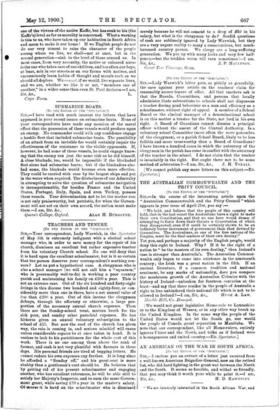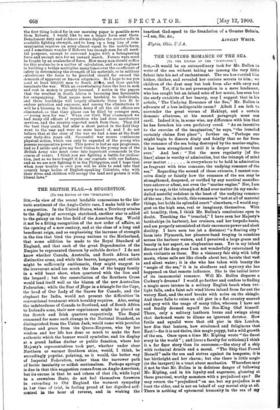AN AMERICAN ON THE WAR IN SOUTH AFRICA.
[To THE EDITOR OP THE "SPECTATOR."]
SIR,—I enclose you an extract of a letter just received from a well-known American Brigadier-General, now on the retired list, who did hard fighting in the great war between the North and the South. It seems so forcible, and withal so friendly, that you may think it worth your while to print it.—I am, " Wa are iutetiely interested in the South African War, and the first thing looked for in our morning paper is possible news from Roberts. I would like to see a larger force sent there. Detachment duty and sickness always deplete the muster rolls in available fighting strength, and to keep bp a long line of com- munication requires an army almost equal to the mobile force, and I sometimes wonder if Roberts has enough men for all need- ful purposes, enough to surround kopjes with a beleaguering force and enough men for an onward march. Future wars must be fought by an avalanche of force. How many men should suffice for this avalanche is a matter of calculation, and as an engineer in building a bridge multiplies many times over the co-efficient of safety in determining the strength of his materials, so in military calculations the force to be provided should far exceed the demands of apparent or known exigencies. So I hope to see you send at least 300,000 men to South Milt...a, and thus quickly terminate the war. With an overwhelming force the loss in men and cost in money is greatly lessened. I notice in the papers that the weather in South Africa is becoming less favourable for campaigning. That means more hardship to individuals, and these hardships will largely eliminate those less fit to endure privation and exposure, and among the eliminations it will be a blessing to the British Army if all the old officers are eliminated, so that their places can be filled by younger men, —` young men for war.' When our Civil War commenced we had many old officers of reputation who had done meritorious services, and the country expected much from them. They did the best they could, but after a short period in the field they went to the rear and were no more heard of, and I do not believe that at the close of the war we had a man at the front over forty-five years old. Successful war means continuous physical action, which can only be expected of the young who possess recuperative power. This power is lost as age progresses, and so I salute and give my best wishes to the young men of the British Army who must come into important commands in the course of events. I think you are fighting a battle for civilisa- tion, just as we have fought it in our contests with our Indians, and as we are now fighting it in the Philippines, and I hope that when your trouble is over you will be able to send into that country large bodies of English-speaking Colonists, who with their wives and children will occupy the land and govern it with liberal laws."







































 Previous page
Previous page